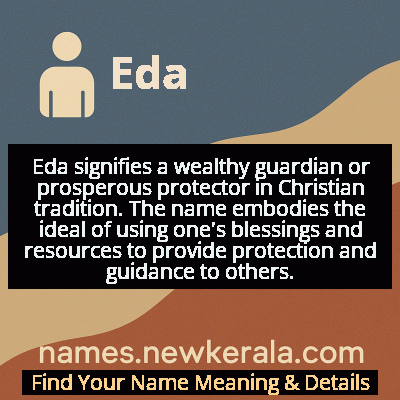Eda Name Meaning & Details
Origin, Popularity, Numerology Analysis & Name Meaning of Eda
Discover the origin, meaning, and cultural significance of the name EDA. Delve into its historical roots and explore the lasting impact it has had on communities and traditions.
Name
Eda
Gender
Male
Origin
Christian
Lucky Number
1
Meaning of the Name - Eda
Eda signifies a wealthy guardian or prosperous protector in Christian tradition. The name embodies the ideal of using one's blessings and resources to provide protection and guidance to others.
Eda - Complete Numerology Analysis
Your Numerology Number
Based on Pythagorean Numerology System
Ruling Planet
Sun
Positive Nature
Leaders, ambitious, highly driven, self-reliant, innovative.
Negative Traits
Overly aggressive, domineering, impatient, selfish.
Lucky Colours
Red, orange, gold.
Lucky Days
Sunday.
Lucky Stones
Ruby, garnet.
Harmony Numbers
2, 3, 9.
Best Suited Professions
Entrepreneurs, managers, engineers.
What People Like About You
Courage, determination, leadership.
Famous People Named Eda
Eda İnce
Academic and Writer
Renowned Turkish literature professor and cultural researcher
Eda Erdem
Professional Volleyball Player
Captain of the Turkish women's national volleyball team and Fenerbahçe
Eda Tahmaz
Journalist and Activist
Prominent Kurdish journalist and human rights advocate
Name Variations & International Equivalents
Click on blue names to explore their detailed meanings. Gray names with will be available soon.
Cultural & Historical Significance
In Turkish Christian communities specifically, Eda maintains strong religious connotations while also representing cultural identity and heritage. The name's dual meaning of wealth and guardianship aligns with Christian values of stewardship and protection of faith, making it a meaningful choice for families seeking to emphasize both spiritual and practical virtues. Historically, the name has been used to signify both material prosperity and spiritual responsibility, reflecting the Christian ideal of using one's blessings to serve and protect others.
Extended Personality Analysis
Individuals named Eda are typically perceived as responsible, protective, and resourceful. They often exhibit natural leadership qualities combined with a strong sense of duty toward those in their care. The 'wealthy guardian' aspect of the name manifests in personality through both material competence and emotional richness—Eda's are often skilled at managing resources while also providing emotional support and guidance to others. Their protective nature makes them reliable friends and family members who take their responsibilities seriously.
Eda's tend to be practical problem-solvers who approach challenges with both wisdom and compassion. They often demonstrate excellent judgment in difficult situations and have a knack for creating stability and security in their environments. While they can be reserved initially, once trust is established, they show deep loyalty and commitment to their relationships. This combination of practical competence and emotional depth makes Eda's particularly effective in roles that require both management skills and interpersonal sensitivity, embodying the ideal of the 'wealthy guardian' in both literal and metaphorical senses.
Modern Usage & Popularity
In contemporary usage, Eda remains a distinctive name choice that bridges traditional and modern sensibilities. While not among the most popular names globally, it maintains steady usage in Christian communities, particularly in Turkey, the Middle East, and among diaspora populations. The name has seen a slight resurgence in recent years as parents seek unique yet meaningful names with strong cultural and religious roots. In modern Christian contexts, Eda is appreciated for its combination of spiritual significance and practical virtues, appealing to families who value both faith and worldly competence. The name's gender flexibility (though specified as male in this context) adds to its contemporary appeal, though it's more commonly used for females in many regions today. Its relative rarity makes it an attractive option for parents seeking a name that stands out while maintaining deep cultural and religious significance.
Symbolic & Spiritual Meanings
Symbolically, Eda represents the harmonious balance between material abundance and protective responsibility. The name embodies the concept of stewardship—managing wealth and resources not for personal gain alone, but for the benefit and protection of others. In Christian symbolism, this aligns with biblical teachings about faithful stewardship and using one's blessings to serve and protect the community. The guardian aspect symbolizes spiritual watchfulness and moral guidance, while the wealth component represents both material and spiritual riches. Eda also carries symbolic weight as a bridge between earthly responsibilities and divine calling, suggesting that true prosperity includes the ability and willingness to protect and guide others. This makes the name particularly resonant in Christian contexts where service and stewardship are central values, representing the ideal of using one's gifts and resources for the greater good.

